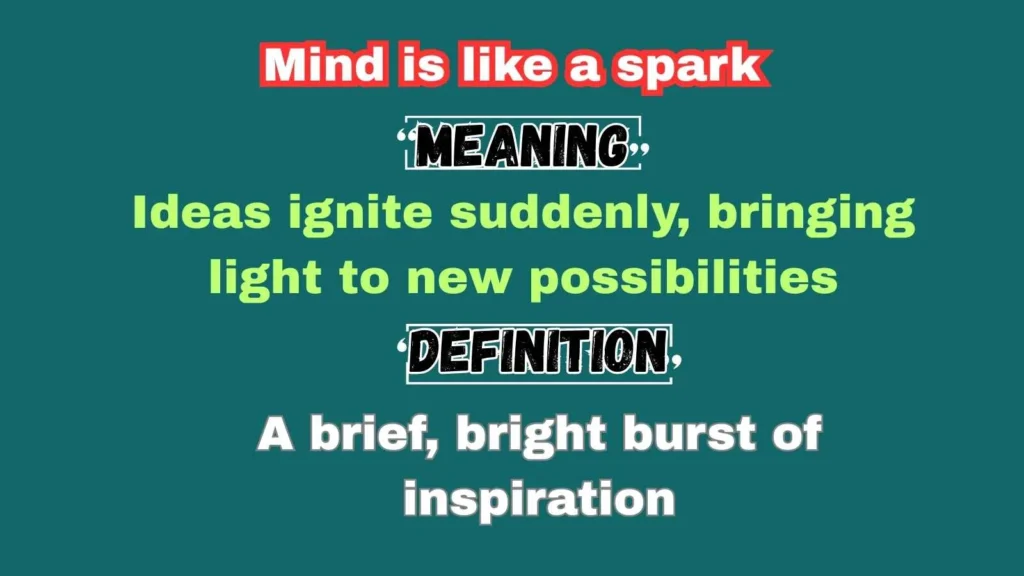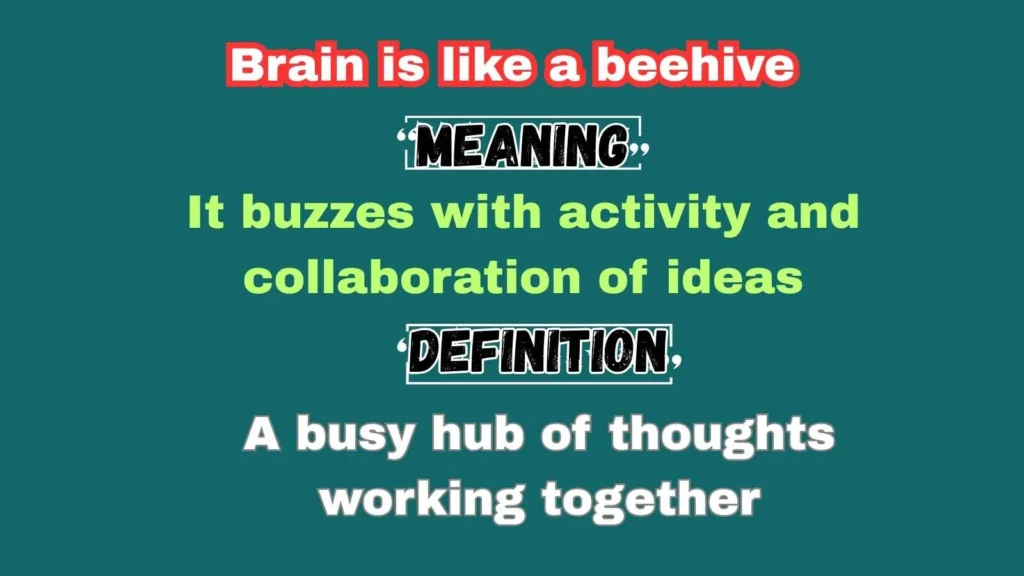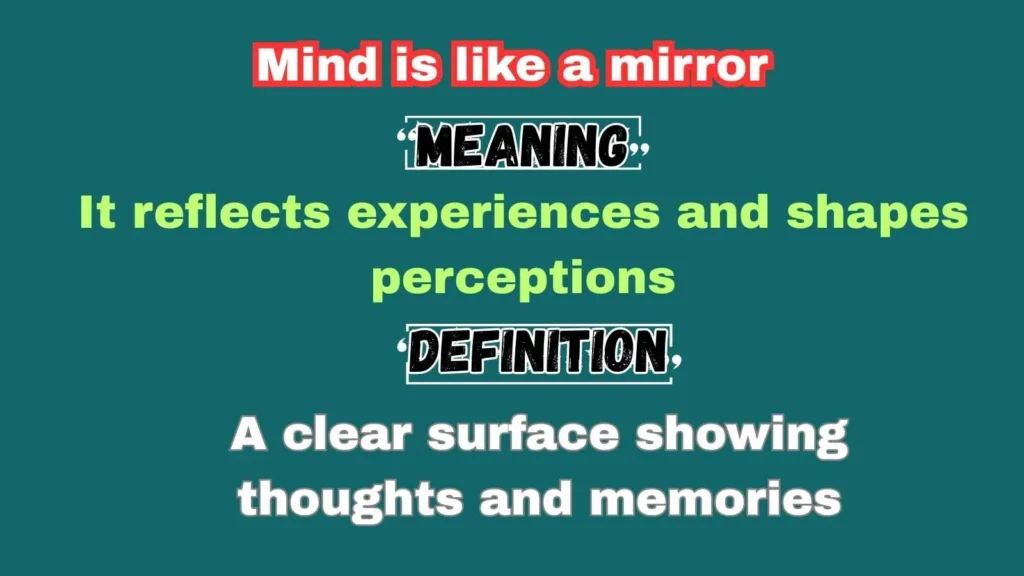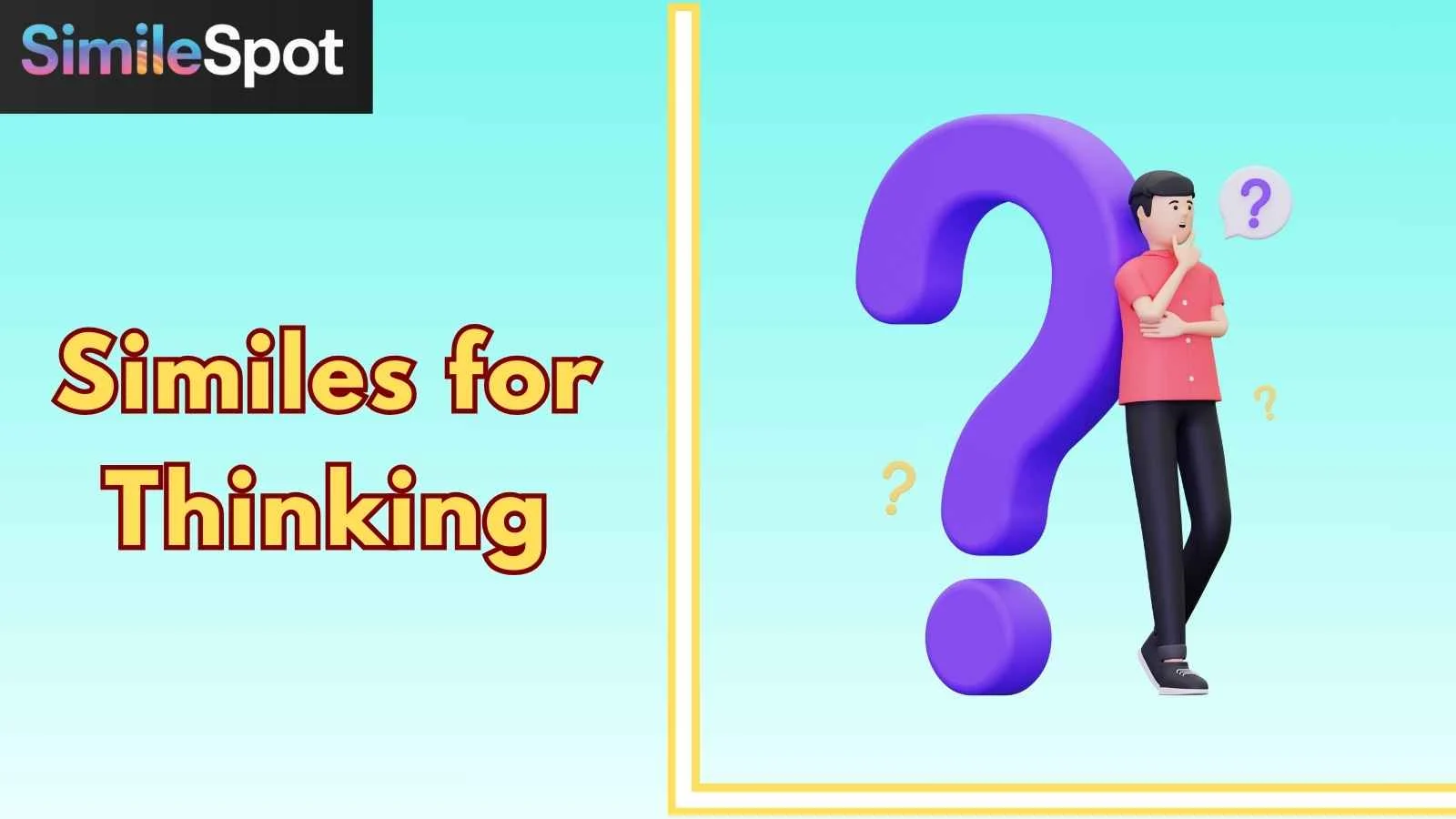Similes are like bridges that connect ideas, making the abstract feel vivid and relatable. They paint pictures with words, turning thoughts into colorful images that spark curiosity and insight.
Exploring similes for thinking is fascinating because it reveals how we describe the mind’s complex dance—how it leaps, wanders, or sparks.
This article unveils a treasure trove of similes that capture the essence of thought, inviting you to weave them into your writing or simply marvel at their creativity. Read on to discover how these comparisons can transform the way you express the art of thinking.
Quick Definition of a Simile
A simile is a figure of speech that compares two unlike things using “like” or “as” to create a vivid image. For example, “Her mind is like a computer” illustrates quick thinking.
5 Quick Similes for Thinking
| Simile | Meaning | Example Sentence |
|---|---|---|
| Thinking is like a river | Thoughts flow continuously, sometimes calm, sometimes rapid | Her thinking was like a river, steady but full of unexpected turns. |
| The mind is like a spark | Ideas ignite suddenly and brightly | His mind was like a spark, flashing with new ideas in the dark. |
| Thoughts are like clouds | They drift, shift, and sometimes vanish | Her thoughts were like clouds, floating aimlessly across her mind. |
| Thinking is like a puzzle | It involves piecing together ideas to form a whole | His thinking was like a puzzle, slowly revealing the big picture. |
| The mind is like a kaleidoscope | Thoughts shift to form new, colorful patterns | Her mind was like a kaleidoscope, constantly creating new visions. |
Thinking is like a river
Meaning: Thoughts flow continuously, sometimes smoothly, sometimes with turbulence.
Definition: A steady stream of ideas that can twist and turn.
- Example 1: Her thinking was like a river, carving new paths through tough problems.
- Example 2: His thoughts flowed like a river, unstoppable and full of energy.
Mind is like a spark

Meaning: Ideas ignite suddenly, bringing light to new possibilities.
Definition: A brief, bright burst of inspiration.
- Example 1: His mind was like a spark, lighting up the room with a single idea.
- Example 2: A spark-like mind flared, and she solved the riddle instantly.
Thoughts are like clouds
Meaning: They drift, change shape, and sometimes fade away.
Definition: Fleeting, ever-shifting ideas in the mind’s sky.
- Example 1: Her thoughts were like clouds, drifting lazily on a calm day.
- Example 2: His thoughts floated like clouds, hard to pin down but beautiful.
Thinking is like a puzzle
Meaning: It involves fitting pieces together to form a clear picture.
Definition: A process of connecting ideas methodically.
- Example 1: His thinking was like a puzzle, each piece revealing more of the solution.
- Example 2: She approached the problem like a puzzle, piecing it together patiently.
Mind is like a kaleidoscope
Meaning: Thoughts shift and create new, colorful patterns.
Definition: A vibrant mix of ever-changing ideas.
- Example 1: Her mind was like a kaleidoscope, each turn revealing a new design.
- Example 2: His kaleidoscope-like mind spun out endless creative ideas.
Brain is like a beehive

Meaning: It buzzes with activity and collaboration of ideas.
Definition: A busy hub of thoughts working together.
- Example 1: Her brain was like a beehive, humming with new plans.
- Example 2: His beehive-like brain produced sweet ideas daily.
Thinking is like a wildfire
Meaning: Ideas spread quickly and uncontrollably.
Definition: A rapid, intense surge of thoughts.
- Example 1: His thinking was like a wildfire, consuming every obstacle in its path.
- Example 2: Her ideas spread like wildfire, igniting everyone’s imagination.
Mind is like a library
Meaning: It stores vast knowledge, accessible when needed.
Definition: A quiet archive of ideas and memories.
- Example 1: Her mind was like a library, full of wisdom waiting to be explored.
- Example 2: His library-like mind held answers to questions no one else could solve.
Thoughts are like stars
Meaning: They shine brightly but are hard to grasp.
Definition: Distant, twinkling ideas that inspire awe.
- Example 1: Her thoughts were like stars, beautiful but out of reach.
- Example 2: His star-like thoughts lit up the darkest problems.
Thinking is like a journey
Meaning: It takes you through unknown paths to new destinations.
Definition: An exploration of ideas with surprises along the way.
- Example 1: His thinking was like a journey, winding through uncharted ideas.
- Example 2: She embarked on a journey-like thought, discovering new insights.
Mind is like a mirror

Meaning: It reflects experiences and shapes perceptions.
Definition: A clear surface showing thoughts and memories.
- Example 1: Her mind was like a mirror, reflecting every detail of the conversation.
- Example 2: His mirror-like mind showed him the truth of his choices.
Thoughts are like waves
Meaning: They rise, fall, and sometimes crash.
Definition: Rhythmic, flowing ideas with varying intensity.
- Example 1: Her thoughts were like waves, gently lapping at new ideas.
- Example 2: His wave-like thoughts crashed with bold solutions.
Thinking is like a storm
Meaning: It can be chaotic, powerful, and transformative.
Definition: A turbulent rush of ideas that reshapes the mind.
- Example 1: His thinking was like a storm, shaking up old beliefs.
- Example 2: Her storm-like thoughts cleared the way for clarity.
Brain is like a computer
Meaning: It processes information quickly and efficiently.
Definition: A logical system for analyzing and storing data.
- Example 1: Her brain was like a computer, calculating every possibility.
- Example 2: His computer-like brain solved complex problems in seconds.
Mind is like a garden
Meaning: It grows ideas with care and nurturing.
Definition: A fertile space where thoughts bloom.
- Example 1: Her mind was like a garden, sprouting new ideas daily.
- Example 2: His garden-like mind cultivated creative solutions.
Thoughts are like birds
Meaning: They soar freely and sometimes fly away.
Definition: Light, fleeting ideas that move swiftly.
- Example 1: Her thoughts were like birds, flitting from one idea to another.
- Example 2: His bird-like thoughts soared above mundane problems.
Thinking is like a dance
Meaning: It’s rhythmic, expressive, and flows with energy.
Definition: A graceful movement of ideas in harmony.
- Example 1: Her thinking was like a dance, elegant and full of rhythm.
- Example 2: His dance-like thoughts moved effortlessly through challenges.
Mind is like a maze
Meaning: It’s complex, with twists and turns to navigate.
Definition: A labyrinth of interconnected thoughts.
- Example 1: Her mind was like a maze, intricate but rewarding to explore.
- Example 2: His maze-like mind found paths others couldn’t see.
Thoughts are like bubbles
Meaning: They float lightly but can pop suddenly.
Definition: Fragile, fleeting ideas that shimmer briefly.
- Example 1: Her thoughts were like bubbles, delicate and full of wonder.
- Example 2: His bubble-like thoughts burst with new insights.
Thinking is like a firework
Meaning: It explodes with color and brilliance.
Definition: A dazzling burst of creative ideas.
- Example 1: His thinking was like a firework, lighting up the discussion.
- Example 2: Her firework-like thoughts stunned everyone with their brilliance.
Brain is like a clock
Meaning: It works steadily, keeping track of ideas.
Definition: A precise mechanism for processing thoughts.
- Example 1: Her brain was like a clock, always ticking with new ideas.
- Example 2: His clock-like brain kept his thoughts perfectly timed.
Mind is like an ocean
Meaning: It’s vast, deep, and full of mysteries.
Definition: An expansive space of endless thoughts.
- Example 1: Her mind was like an ocean, holding depths no one could fathom.
- Example 2: His ocean-like mind hid treasures of wisdom.
Thoughts are like seeds
Meaning: They start small but grow into big ideas.
Definition: Tiny beginnings with potential for growth.
- Example 1: Her thoughts were like seeds, sprouting into brilliant plans.
- Example 2: His seed-like thoughts grew into a forest of innovation.
Thinking is like a breeze
Meaning: It’s light, refreshing, and moves gently.
Definition: A soft flow of ideas that brings clarity.
- Example 1: Her thinking was like a breeze, clearing away confusion.
- Example 2: His breeze-like thoughts brought calm to the chaos.
Mind is like a telescope
Meaning: It zooms in on details or sees far-off possibilities.
Definition: A tool for focusing or broadening thought.
- Example 1: Her mind was like a telescope, spotting distant solutions.
- Example 2: His telescope-like mind zeroed in on tiny details.
Thoughts are like threads
Meaning: They weave together to form complex ideas.
Definition: Fine strands that create a tapestry of thought.
- Example 1: Her thoughts were like threads, weaving a beautiful story.
- Example 2: His thread-like thoughts connected into a brilliant plan.
Thinking is like a flame
Meaning: It burns brightly but needs fuel to keep going.
Definition: A passionate spark of ideas that can grow.
- Example 1: Her thinking was like a flame, warm and full of energy.
- Example 2: His flame-like thoughts lit up every conversation.
Brain is like a map
Meaning: It guides you through ideas and possibilities.
Definition: A structured guide for navigating thoughts.
- Example 1: Her brain was like a map, leading her to the right solution.
- Example 2: His map-like brain charted paths through complex problems.
Mind is like a canvas
Meaning: It’s a blank space for painting ideas.
Definition: An open space for creative expression.
- Example 1: Her mind was like a canvas, splashed with colorful thoughts.
- Example 2: His canvas-like mind created masterpieces of ideas.
Thoughts are like ripples
Meaning: They spread outward, affecting other ideas.
Definition: Small ideas with far-reaching impact.
- Example 1: Her thoughts were like ripples, spreading inspiration to others.
- Example 2: His ripple-like thoughts created waves of change.
Thinking is like a key
Meaning: It unlocks new ideas and solutions.
Definition: A tool for opening doors to understanding.
- Example 1: Her thinking was like a key, unlocking hidden insights.
- Example 2: His key-like thoughts opened new possibilities.
Mind is like a factory
Meaning: It produces ideas with efficiency and structure.
Definition: A busy hub of thought production.
- Example 1: Her mind was like a factory, churning out brilliant ideas.
- Example 2: His factory-like mind built solutions with precision.
Thoughts are like petals
Meaning: They’re delicate and beautiful but can fall away.
Definition: Fragile ideas that add beauty to the mind.
- Example 1: Her thoughts were like petals, soft but stunning in their arrangement.
- Example 2: His petal-like thoughts fluttered with gentle creativity.
Thinking is like a bridge
Meaning: It connects ideas to form understanding.
Definition: A link between concepts for clarity.
- Example 1: Her thinking was like a bridge, joining old and new ideas.
- Example 2: His bridge-like thoughts spanned gaps in knowledge.
Brain is like a prism
Meaning: It breaks ideas into colorful perspectives.
Definition: A tool for refracting thoughts into new angles.
- Example 1: Her brain was like a prism, splitting ideas into vibrant insights.
- Example 2: His prism-like brain revealed new ways to see the problem.
Spark Your Writing with Similes
Similes can transform your creative work, adding depth and vivid imagery. Here’s how to weave them into different forms of writing:
- Poetry: Use similes like “thoughts are like stars” to create emotional, visual lines that resonate with readers. For example, a poem about creativity could describe the mind as a kaleidoscope, shifting with every verse.
- Stories: Sprinkle similes like “thinking is like a wildfire” to describe a character’s racing thoughts, making their inner world vivid. A detective’s brain could be “like a map,” guiding them through clues.
- Songs: Craft lyrics with similes like “mind is like an ocean” to evoke deep emotions. A chorus could repeat “thoughts like waves” to create a rhythmic, memorable hook.
- Essays: Add similes like “thinking is like a puzzle” to clarify complex ideas. In an academic essay, compare a scholar’s mind to a library to illustrate their depth of knowledge.
Experiment by mixing similes with sensory details or combining them for layered effects, like “Her mind, a kaleidoscope of wildfire thoughts, sparked new ideas.”
Craft Vivid Narratives with Thoughtful Similes
To make your writing stand out, choose similes that match your tone and audience. A simile like “thoughts are like clouds” suits a dreamy poem, while “brain is like a computer” fits a tech essay. Test different similes to find the perfect fit, and avoid overusing them to keep your writing fresh.
Elevate Your Prose with Simile Precision
When using similes, ensure they’re clear and relevant. For example, in a story, “Her thoughts were like ripples” can show a character’s growing realization. Revise your work to replace clichés with unique similes like “mind is like a prism” to add originality.
FAQs
What is a simile in simple terms?
A simile compares two different things using “like” or “as” to create a vivid image, like “thinking is like a river.”
Why use similes for thinking?
Similes make abstract thoughts relatable and engaging, helping readers visualize mental processes creatively.
How can similes improve my writing?
They add imagery and emotion, making your poems, stories, or essays more vivid and memorable.
Are there similes specific to critical thinking?
Yes, similes like “thinking is like a puzzle” or “brain is like a map” highlight logical, problem-solving processes.
Can similes be overused in writing?
Yes, too many similes can overwhelm readers. Use them sparingly to maintain impact and clarity.
A Final Thought on Similes for Thinking
Similes bring the mind’s workings to life, painting thoughts as rivers, sparks, or stars. They make writing vibrant and relatable, whether in poetry, stories, or essays.
Embrace these comparisons to add flair to your work and captivate your audience. Try weaving them into your next piece to spark creativity and connect with readers on a deeper level.

